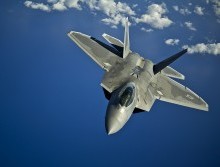
US fighter jets are among the troops being sent to the Middle East. Illustrative. Photo Courtesy of U.S. Air Force photo/Tech. Sgt. Michael Holzworth.
The United States is adding to an already-increased deployment in the Middle East— due to an ongoing threat assessment of a “campaign” by Iran—sending a dozen fighter jets as part of a 1,500 troop force. The US Defense establishment on Friday described the troops as defensive in nature and include extending the deployment of a Patriot missile defense battery already sent to the region, making the number of new troops less than 1,000, according to a press briefing posted to the US Defense Department website.
The American military posturing comes amidst multiple attacks against US interests and allies in the region that the US has attributed to Iran or its proxies. “I wouldn’t just call them threat streams, I’d call them a campaign designed by the Iranians against US interests, US forces and our partners in the region,” Vice Admiral Mike Gilday said during the press briefing, stating these threats range from the Strait of Hormuz that’s critical to the ocean transport of oil to Yemen and Iraq.
“…The reason I described it as a campaign is because you’re seeing activity across multiple domains—across the sea, from the air and on the land—by either Iranian forces or proxies. And so it’s more complicated than just a single threat stream. And they’ve acted on it.”
In the press briefing, Gilday openly accused the Iranian Revolutionary Guards Corp of being behind sea mines that attacked shipping in the region, as well as Iranian proxies attacking a Saudi oil pipeline and a rocket attack that struck not far from the US embassy complex in Baghdad, Iraq.
“We believe with a high degree of confidence that this stems back to the leadership of Iran at the highest levels and that all of the attacks that I mentioned have been attributed to Iran through their proxies or their forces,” said Gilday. According to the transcript of the briefing, reporters in the briefing were struck by the confidence-level in Gilday’s assertion of Iran being the origin of the attacks.
The US military moves come amidst a heightened tension with Iran that ranges from tough rhetoric, to increased US sanctions, to announcements by Iran of scaling back their commitments toward the nuclear agreement with world powers, to the attacks in the Middle East.
Despite the concerns, the Americans focused on defense—not offense—against Iran, a position US President Donald Trump noted in comments to reporters on Friday. “We’re going to be sending a relatively small number of troops, mostly protective. And some very talented people are going to the Middle East right now, and we’ll see how—and we’ll see what happens.”
Trump, whose comments were published to the White House website, later predicted that the situation would not turn to open warfare between the US and Iran. “I think it’s going to be very good in the Middle East. Iran has been a—as you know, they stage terror all over the world. They’re a much different country now than when I first got here. When I first got here, they were at 14 different locations, fighting. Right now, they don’t—I don’t think Iran wants to fight. And I certainly don’t think they want to fight with us,” said Trump.
In Friday’s Defense Department briefing, Katie Wheelbarger. acting assistant secretary of defense for International Security Affairs, reiterated that the US troop deployments don’t impact the American strategy regarding Iran.
“I want to make clear that our policy with respect to Iran has not changed. As the president and the secretary have been clear, we do not seek conflict with Iran. We do not see these additional capabilities as urging hostilities. We see them as defensive in nature,” Wheelbarger told reporters.
“Again, our policy remains an economic and diplomatic effort to bring Iran back to the negotiating table to encourage a comprehensive deal that addresses the range of their destabilizing behavior in the region.”
That focus on addressing Iranian behavior, including their pursuit of nuclear weapons, has been a key approach for the Trump Administration. And President Trump is still keeping that focus in mind amidst the current tensions.
“They cannot have nuclear weapons,” said Trump on Friday discussing Iran. “And under the [former President Barack] Obama horrible agreement, they would’ve had nuclear weapons within five or six years. They can’t have nuclear weapons, and they understand that.”
(By Joshua Spurlock, www.themideastupdate.com, May 26, 2019)
